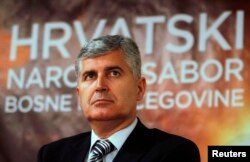Preliminary results from Sunday’s elections for national, regional and local representatives in Bosnia and Herzegovina show nationalists won most of the seats.
With a majority of the votes counted, nationalist candidates Bakir Izetbegovic of the main Bosniak SDA party and Dragan Covic of the Croat HDZ BIH party have won seats in the collective three-man presidency.
The race for the Serb seat remains too close to call, with two nationalist candidates, Zeljka Cvijanovic of Bosnian Serb ruling SNSD and opposition figure Mladen Ivanic, running neck and neck.
Collective presidency
The collective presidency is an element of the power-sharing arrangement created by the U.S. mediated Dayton Peace Accord, which ended the ethnic war that took 100,000 lives between 1992 and 1995.
Fifty-four percent of nearly 3.3 million eligible Bosnian voters went to the polls Sunday, about two percent lower than in the 2010 elections.
The turnout reflected widespread discontent with the country's corrupt and inefficient politicians.
Unemployment is at 44 percent. At the start of the year, massive protests erupted as result the government's failure to implement the reforms required for Bosnia and Herzegovina to enter the European Union.






